Spending time enjoying the natural, quiet of the green space that is ‘The Howe’ is important for many of us in our community. Not only for our trustees, allotment holders, and volunteers – but for our many visitors too.
But did you know that being at one with Nature is beneficial to your health?
Most gardeners or allotmenteers have discovered that green space is good for the soul. Now Scientists have carried out research which backs up what many of us intuitively already know to be true.
And the benefits are there to see from early childhood through to old age. From physical health, emotional well-being, learning and creativity, to a sense of connection with our community and the world.
Children – Development and Learning
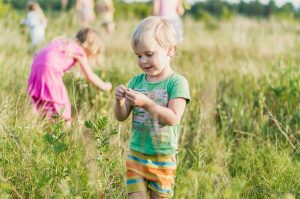 As parents and grandparents will tell you, nature never fails to stimulate curiosity and imagination in young children. A report commissioned in 2024 by WWF has recently highlighted the enormous benefits of nature to children, especially those from more disadvantageous backgrounds.
As parents and grandparents will tell you, nature never fails to stimulate curiosity and imagination in young children. A report commissioned in 2024 by WWF has recently highlighted the enormous benefits of nature to children, especially those from more disadvantageous backgrounds.
So it’s that rare opportunity to discover a frog, spot a brightly coloured beetle or butterfly, marvel at the variety of colours of leaves in autumn or listen to birdsong that we aim to create on The Howe for our local visiting families and school children.
“Having access to grassland areas and wild ponds on The Howe gives our children experience of a wonderful green space that improves their mental health and well being. Exploring outdoors encourages an active lifestyle, putting good habits in place for life. The long grasses and ponds allow the children to experience a rich diversity of wildlife, improving their observation skills and developing a love and respect for the ecosystem, creating the eco citizens of the future. A huge thank you to the Howe Trust for your kind donation to help us buy the equipment that we need to take full advantage of your fantastic space.” Natalie and Judy, Wheatley Nursery School
Young People – Growth and Well-being
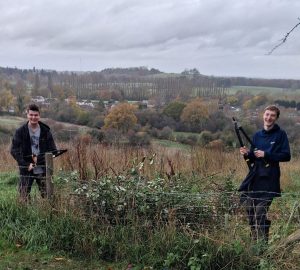 Nature is also a proven way to support the mental well-being of teenagers and young people. It provides a peaceful space away from academic and social pressures, reducing stress and anxiety. Being in natural settings can also provide space for teenagers to reflect and form a stronger sense of self and their values. It forges connections with others, promoting teamwork and communication in positive, low-pressure ways. Of course volunteering is also a great way to strengthen young peoples’ applications for university, apprenticeships or the world of work too.
Nature is also a proven way to support the mental well-being of teenagers and young people. It provides a peaceful space away from academic and social pressures, reducing stress and anxiety. Being in natural settings can also provide space for teenagers to reflect and form a stronger sense of self and their values. It forges connections with others, promoting teamwork and communication in positive, low-pressure ways. Of course volunteering is also a great way to strengthen young peoples’ applications for university, apprenticeships or the world of work too.
In recent years we’ve had a steady stream of Duke of Edinburgh scheme students from our local secondary schools volunteer with us. They come along twice a month for a few hours to carry out a huge variety of tasks on The Howe. It’s been wonderful watching as they’ve learnt new practical skills from the project work they do with us, and how they’ve gone on to grow in confidence and maturity.
“It’s rewarding to see how you have affected the local environment, the changes in nature and the physical landscape. I found working in teams to be quite challenging; working with new people, communication and coordinating with others was a challenge because I am quite shy but I have learnt a lot about communicating with others.” D of E Volunteer Matthew
“I have learnt about hard work and seeing where it gets you, dedication, team work, and leadership. It has also been a humbling experience to learn how much goes into caring for the environment and into creating a lovely space for everyone to enjoy.” D of E Volunteer Ollie
For Adults – Life Balance and Overall Health
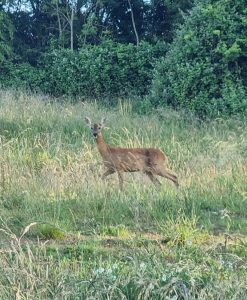 21st Century life can be challenging, especially for those with limited budgets or little to no access to their own outdoor space. But Nature is free, it’s open to all and noticing and embracing its innate beauty can help relieve stress. Being in nature lowers cortisol levels, improves concentration, and restores mental energy. This is often referred to as the “restorative effect” of green spaces.
21st Century life can be challenging, especially for those with limited budgets or little to no access to their own outdoor space. But Nature is free, it’s open to all and noticing and embracing its innate beauty can help relieve stress. Being in nature lowers cortisol levels, improves concentration, and restores mental energy. This is often referred to as the “restorative effect” of green spaces.
Physical activities like walking or carrying out land-related tasks (like planting, weeding or fence mending) can also boost cardiovascular health and overall fitness.
That’s why our volunteers find working on The Howe is so valuable. Watching the red kites soar or just taking time to listen to the bleating of sheep or the thrum of insects in the long grass is so therapeutic. The peaceful nature of The Howe provides everyone with an essential counterbalance to our fast-paced, technology-driven lifestyles.
For Older Adults – Cognitive and Emotional Health
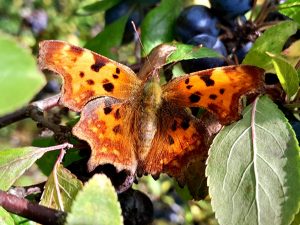 Regular contact with nature has been shown to slow cognitive decline, lift mood, and ease symptoms of depression or loneliness in older people.
Regular contact with nature has been shown to slow cognitive decline, lift mood, and ease symptoms of depression or loneliness in older people.
Many of our older visitors say that simply sitting quietly on a bench on The Howe – with a friend or just a thermos of tea for company can have a huge restorative effect.
Gentle outdoor activity helps mobility as it promotes flexibility and strength while reducing the risk of chronic diseases.
Nature also can provide a sense of belonging – through continuity and comfort, connecting older adults to memories, the wider community, and the natural world.
(Photo of butterfly and roe deer taken on The Howe by volunteer, E. Madden 2025)
Dalton Field Project
Over the coming month and years our volunteers are working to create a new, more accessible area on the Howe – called Dalton’s Field.
Located just down from our main allotment entrance and with wonderful views over the land, it will be a space where everyone, including those with mobility challenges, can visit and enjoy being at one with nature.
As with everything on The Howe we are working with nature. We’re creating a small wildlife pond, planting new trees, native hedges and plants as well as wildflowers. It will take time to take shape – as everything we do is reliant on the time our wonderful volunteers have to give us – but we’re very excited to see it grow and mature and become a special place to visit on The Howe.
Join Us
If you’d like to learn more about The Howe then why not join us on a Guided Walk.
Or if you’d like to help or find out more about getting involved with our work then we’d love to hear from you – simply email us or complete a contact form.
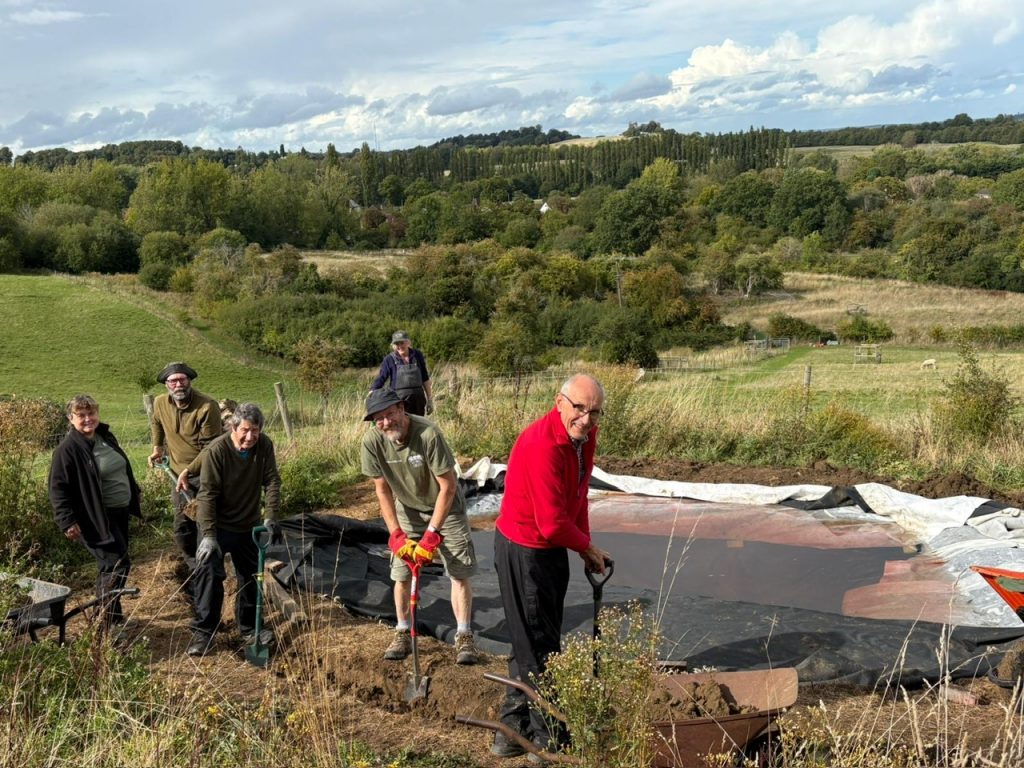
Leave a Reply